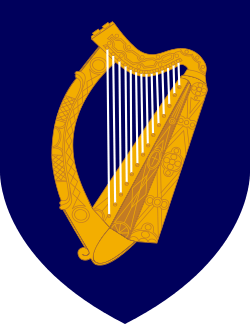National Security Committee (Ireland)
 | |
| Committee overview | |
|---|---|
| Formed | 1974[1] |
| Committee executive |
|
| Parent department | Department of the Taoiseach |
The National Security Committee (NSC) of Ireland is a secretive inter-departmental committee responsible for ensuring that the Taoiseach (Prime Minister of Ireland) and Government of Ireland are kept informed of high-level national security, intelligence and defence issues, and the state's response to them.[2][3]
The National Security Committee is chaired by the Secretary General to the Irish Government/Secretary General of the Department of the Taoiseach, and comprises; the Commissioner of the Garda Síochána, the Secretary General of the Department of Justice and Equality, the Chief of Staff of the Defence Forces, the Secretary General of the Department of Defence, and the Secretary General of the Department of Foreign Affairs and Trade.[4][5] The Revenue Commissioners, Department of Communications, Energy and Natural Resources and Department of Transport, Tourism and Sport also have intelligence roles, but are not full members of the NSC.[1]
The NSC meets on a regular scheduled basis and convenes additionally when required. The Taoiseach's office is responsible for calling meetings of the NSC.[6] It was established in 1974 tasked with advising the Taoiseach and cabinet on high-level security issues. The committee receives threat assessments from the Garda Commissioner and the Chief of Staff, and reviews the overall security situation in the domestic and international environment.[7] The Minister for Defence receives monthly intelligence, state security and defence briefings from the Director of Military Intelligence.[8]
Members
| Structure of the Irish National Security Committee | |
|---|---|
| Chair | Secretary General to the Government of Ireland |
| Statutory Attendees | Secretary General of the Department of Justice and Equality Commissioner of the Garda Síochána Secretary General of the Department of Defence Chief of Staff of the Defence Forces Secretary General of the Department of Foreign Affairs and Trade |
| Intelligence Advisor | Director of Military Intelligence |
| Regular Attendees | Revenue Commissioners Department of Communications, Energy and Natural Resources Department of Transport, Tourism and Sport |
Terrorism threat level
The constituents of the National Security Committee deliberate on the Republic of Ireland's International Terror Threat Level. Five levels are used to grade the international threat of a terrorist attack to Ireland; low, moderate, substantial, severe and critical. The gradings are based on a series of factors, including information supplied by international authorities.[9] The threat level is administered by the Garda Síochána.
International Terror Threat Level:
- Low – An attack is deemed unlikely.
- Moderate – An attack is possible, but not likely.
- Substantial – An attack is a strong possibility.
- Severe – An attack is highly likely.
- Critical – An attack is imminent.[10]
The International Terror Threat Level was raised from low to moderate following the January 2015 Île-de-France attacks.[11]
National Civil Aviation Security Committee
The National Civil Aviation Security Committee (NCASC) is a standing committee established in 1974.[12] The purpose of the NCASC is to advise the Irish government and civil aviation industry of security policy for civil aviation, to recommend and review security measures at airports and to coordinate the various interests involved. The National Civil Aviation Security Committee meets at a minimum biannually.[13] The NCASC comprises senior representatives of government departments, Irish airports, Irish airlines, the Garda Síochána, the Defence Forces, An Post, Customs & Excise (Revenue), the Irish Aviation Authority (IAA), and the Irish Airline Pilots Association (IALPA). The committee was established under the National Civil Aviation Security Programme (NCASP) which is classified on security grounds, and therefore the deliberations of the committee are confidential.[14]
Continuity of government
The National Security Committee is the conduit for officials to communicate with the Taoiseach and/or cabinet members if their minister – the normal channel – became unavailable (or was killed). In preparation for such extreme events drafts of emergency powers legislation have been drawn up in secret by officials from the Department of Justice, including legislation to deal with circumstances such as an attack on cabinet involving numerous deaths.[15]
See also
References
- 1 2 Murphy, Michael (15 November 2014). "State security: why we're at risk". The Irish Times. Retrieved 11 July 2015.
- ↑ "Annual Report 2013" (PDF). Department of Defence and Defence Forces. Retrieved 11 July 2015.
- ↑ "National Security Committee". Kildare Street. Retrieved 11 July 2015.
- ↑ "Defence Forces Strategy Statement 2003-2005" (PDF). Defence Forces Ireland. Retrieved 11 July 2015.
- ↑ "Annual Report to the Minister for Defence for 2007" (PDF). Department of Defence and Defence Forces. Retrieved 11 July 2015.
- ↑ Roche, Barry (15 November 2015). "Coveney plays down threat of Paris-type attacks in Ireland". The Irish Times. Retrieved 15 November 2015.
- ↑ "Strategy Statement 2008 - 2010" (PDF). Department of Defence and Defence Forces. Retrieved 11 July 2015.
- ↑ "Department of Defence and Defence Forces Annual Report 2012" (PDF). military.ie. Retrieved 11 July 2015.
- ↑ Williams, Paul (13 January 2016). "Intelligence units monitor 40 suspected Isil supporters". Irish Independent. Retrieved 17 January 2016.
- ↑ O'Keeffe, Cormac (2 May 2016). "What is the reality of the threat posed by Islamic extremists in Ireland?". Irish Examiner. Retrieved 11 May 2016.
- ↑ Brady, Tom (23 March 2016). "Garda snipers and extra Army bomb disposal officers in place for 1916 commemorations". Irish Independent. Retrieved 25 March 2016.
- ↑ "Departmental Bodies of the Department of Transport". kildarestreet.com. Retrieved 11 July 2015.
- ↑ "Topical Issue Debate/State Airports". kildarestreet.com. Retrieved 11 July 2015.
- ↑ "Statement on Dublin Airport by the Chairman of the National Civil Aviation Security Committee". Merrion Street. Retrieved 11 July 2015.
- ↑ Mulqueen, Michael (2009). Re-evaluating Irish national security policy : affordable threats?. Manchester: Manchester University Press. ISBN 978-0-7190-8027-2.